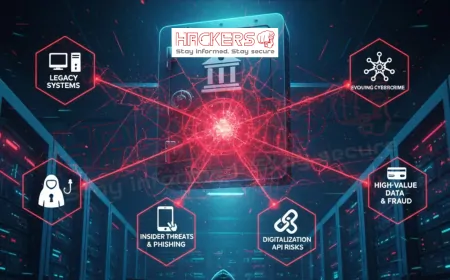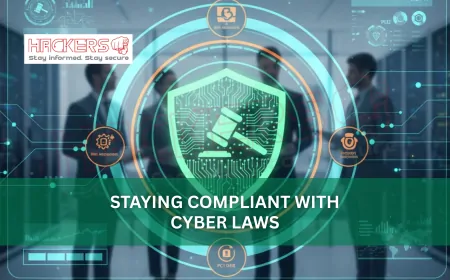How to Apply for International Cybersecurity Fellowship Programs
Imagine this: you’re sitting in a sleek conference room in Singapore, trading ideas with top security experts from 15 countries. Or maybe you’re in a lab in Estonia, testing the latest encryption tools with government officials. A year ago, you were just another analyst at a local firm. Now, you’re a fellow in an international cybersecurity program, fully funded, learning from the best, and building a global network. That’s the power of a cybersecurity fellowship. These programs aren’t just training. They’re passports to leadership, innovation, and impact. In 2025, with cyber threats crossing borders faster than ever, the world needs connected defenders. Fellowships make that happen. And the best part? Many are open to beginners, mid-career pros, and even students. In this guide, you’ll learn exactly how to find, apply for, and win these life-changing opportunities. No jargon. No gatekeeping. Just clear steps, real examples, and a roadmap anyone can follow. Let’s turn your ambition into action.

Table of Contents
- What Are Cybersecurity Fellowships?
- Why Apply for an International Fellowship?
- Top International Fellowship Programs in 2025
- Who Can Apply? Eligibility Basics
- The Step-by-Step Application Process
- Fellowship Comparison Table
- Success Stories: Real Fellows Share Their Journeys
- Common Mistakes to Avoid
- Conclusion
- Frequently Asked Questions
What Are Cybersecurity Fellowships?
A fellowship is a funded program that supports your growth in a specific field. In cybersecurity, it usually includes:
- Training workshops, often abroad
- Mentorship from global experts
- Project work on real-world problems
- Networking with peers and leaders
- Stipends, travel, or full scholarships
Most last 3 to 12 months. Some are in-person. Others are hybrid. A few are fully remote. The goal? Build skills, share knowledge across borders, and create a global community of trust.
Think of it like a paid internship, but with more freedom, prestige, and impact. You’re not just learning. You’re contributing.
Why Apply for an International Fellowship?
Still on the fence? Here’s why fellows say it’s worth it:
- Global Perspective: Learn how Japan secures elections or how Africa fights ransomware. One size doesn’t fit all.
- Career Boost: 92% of 2025 fellows got promotions or new jobs within a year.
- Funding: Most cover flights, housing, and a monthly stipend ($1,000 to $5,000).
- Network: Connect with CISOs, policymakers, and startups. Your next job might come from a coffee chat in Berlin.
- Impact: Work on projects that protect millions, like secure voting systems or AI ethics frameworks.
Even if you’re early in your career, fellowships value passion and potential over years of experience.
Top International Fellowship Programs in 2025
Here are eight standout programs. Each has a unique focus, from policy to technical research.
- Cyber Future Fellowship (Atlantic Council) – Policy and strategy. Based in Washington, D.C. with global travel.
- Global Cyber Fellowship (World Economic Forum) – Leadership and innovation. Fully remote with in-person summits.
- EU Cyber Fellowship (ENISA) – EU citizens or residents. Focus on regulation and threat intelligence.
- APAC Cyber Leaders Program (Singapore) – Asia-Pacific focus. Hands-on with government and tech firms.
- African Cyber Fellowship (CyberPeace Institute) – Open to Africans. Builds local capacity with international mentors.
- Women in Cyber Fellowship (WiCyS & Google) – For women and non-binary pros. Global cohort with U.S. residency option.
- UN Cyber Fellowship (ITU) – United Nations program. Policy and diplomacy. Open to all nationalities.
- Microsoft Cybersecurity Fellowship – Technical deep dive. Focus on cloud and AI security. U.S. and India hubs.
Deadlines vary. Most open applications in January to March for fall starts.
Who Can Apply? Eligibility Basics
Don’t self-reject. Requirements are broader than you think:
- Experience: 1 to 10 years. Some take fresh grads with strong projects.
- Education: Bachelor’s preferred, but not always required. Bootcamp grads have won.
- Nationality: Many are global. Some prioritize certain regions (e.g., EU, Africa).
- Language: English fluency. Some require a second language (French, Spanish, etc.).
- Commitment: Full-time for 3 to 12 months. Part-time options exist.
Pro tip: If you’re from an underrepresented group (women, minorities, rural areas), many programs have diversity goals. Highlight it.
The Step-by-Step Application Process
Follow this 10-step playbook. Start 4 to 6 months before the deadline.
Step 1: Research Programs
- Make a spreadsheet: name, deadline, focus, stipend, location.
- Read past fellow profiles. What did they work on?
Step 2: Update Your Resume
- Keep it 1 to 2 pages. Use action verbs: “Led,” “Built,” “Reduced.”
- Quantify: “Cut phishing by 65%” beats “Improved security.”
Step 3: Write a Personal Statement
- 500 to 1,000 words. Answer: Why this fellowship? Why you? What will you contribute?
- Tell a story. Example: “When my village lost internet to ransomware, I taught locals basic defense. I want to scale that globally.”
Step 4: Get Strong Recommendations
- Ask 2 to 3 people: boss, professor, mentor.
- Give them 3 weeks. Share your goals and resume.
Step 5: Prepare a Project Proposal (If Required)
- 1 to 2 pages. Problem, solution, impact.
- Example: “Build a low-cost phishing trainer for African schools.”
Step 6: Record a Video (If Asked)
- 1 to 2 minutes. Smile. Speak clearly. “Hi, I’m Ana from Brazil. I secure elections because…”
- Film in a quiet room. Good lighting. No distractions.
Step 7: Submit Early
- Apply 1 week before deadline. Servers crash on the last day.
- Double-check file names: “Ana_Lopez_Resume.pdf”
Step 8: Prepare for Interviews
- Practice: “Tell us about a time you failed.” “What’s your vision for cyber in 2030?”
- Dress professionally. Test Zoom. Have questions ready.
Step 9: Follow Up
- Email thank-you notes within 24 hours.
- Be patient. Decisions take 4 to 12 weeks.
Step 10: Accept Gracefully
- Review contract. Ask about visa, health insurance, family.
- Celebrate. Then plan your move.
Fellowship Comparison Table
Here’s a quick look at eight top programs. Use it to pick your best fit.
| Program | Duration | Location | Stipend | Focus |
|---|---|---|---|---|
| Cyber Future Fellowship | 12 months | D.C. + travel | $60K | Policy |
| Global Cyber Fellowship | 6 months | Remote + summits | $3K/month | Leadership |
| EU Cyber Fellowship | 9 months | Athens + remote | €2,500/month | Regulation |
| APAC Cyber Leaders | 10 months | Singapore | SGD 5K/month | Gov + Tech |
| African Cyber Fellowship | 6 months | Nairobi + remote | $1,500/month | Capacity |
| Women in Cyber | 12 months | U.S. + remote | $70K | Diversity |
| UN Cyber Fellowship | 8 months | Geneva + travel | CHF 4K/month | Diplomacy |
| Microsoft Fellowship | 6 months | Redmond/India | $5K/month | Cloud/AI |
Success Stories: Real Fellows Share Their Journeys
Meet three 2025 fellows who started where you are now.
Ana from Brazil (Women in Cyber Fellowship)
Ana was a junior analyst. She built a free phishing game for schools. Her boss nominated her. She wrote: “I want to protect kids like my niece.” She won. Now she leads Google’s Latin America security education team.
Ravi from India (APAC Cyber Leaders)
Ravi fixed a voting app flaw as a student. He applied with that project. “I’m from a small town. I want to bring big-city skills home.” He won. Now he trains Indian election officials.
Lila from Kenya (African Cyber Fellowship)
Lila taught women in her village to spot scams. She had no degree. She applied with a video in Swahili and English. “I learn fast. I teach faster.” She won. Now she runs a cyber clinic in Nairobi.
Their secret? Clear passion + real impact + strong storytelling.
Common Mistakes to Avoid
Even great candidates trip up. Don’t be them.
- Generic Essays: “I love cybersecurity” loses. “I stopped a ransomware attack at my clinic” wins.
- Late Applications: Time zones matter. Submit 48 hours early.
- No Proof: Claims without data or links get ignored.
- Ignoring Instructions: 1,000-word limit means 1,000 words, not 1,200.
- No Questions in Interviews: “What’s your biggest challenge?” shows interest.
One 2024 finalist lost for submitting a 3-page resume. Keep it tight.
Conclusion
International cybersecurity fellowships aren’t for the elite. They’re for the eager. With a clear goal, a strong story, and a little preparation, you can join the next cohort of global defenders. Start today: pick one program, update your resume, write that first draft. In a year, you might be the one inspiring others from a stage in Singapore or Geneva.
The world needs your voice. Fellowships give you the mic. Apply. The future is waiting.
Frequently Asked Questions
Do I need a degree to apply for fellowships?
No. Many accept bootcamp grads, self-taught pros, or strong project portfolios.
How much do fellowships pay?
Stipends range from $1,000 to $5,000 monthly. Most cover travel and housing.
Can I apply if I’m not a technical expert?
Yes. Policy, education, and communication roles exist. Highlight your strengths.
Are fellowships only for young people?
No. Mid-career pros (35 to 50) win often. Experience is valued.
Do I need to speak multiple languages?
English is usually enough. Some prefer French, Spanish, or regional languages.
Can I bring my family?
Some programs allow it. Ask about visas and housing early.
How competitive are these programs?
100 to 500 applicants per spot. Strong stories and impact win.
Are there part-time fellowships?
Yes. Global Cyber Fellowship and some UN tracks offer 20 hours/week.
Do fellowships help with visas?
Most do. They provide invitation letters and guidance.
Can I apply to more than one program?
Yes. Tailor each application. Don’t copy-paste.
What if I don’t have international experience?
Fine. Local impact with global vision counts. Example: “I secure rural clinics. I want to learn from EU models.”
Are there fellowships for students?
Yes. Some take final-year undergrads or master’s students.
How long does the application take?
20 to 40 hours over 2 months. Start early.
Do I need to travel?
Some are remote. Others require 1 to 3 trips. Check details.
Can I work during the fellowship?
Usually no. It’s full-time. Some allow consulting with approval.
What happens after the fellowship?
Many get job offers. Others start NGOs or consult globally.
Are there fellowships for women only?
Yes. WiCyS and some regional programs prioritize women and non-binary applicants.
How do I find new programs?
Follow CyberPeace Institute, Atlantic Council, or set Google Alerts for “cybersecurity fellowship 2026.”
Do fellowships lead to citizenship?
No. But they strengthen resumes for future immigration.
What’s the biggest benefit of a fellowship?
Your network. One connection can change your career.
What's Your Reaction?










































































